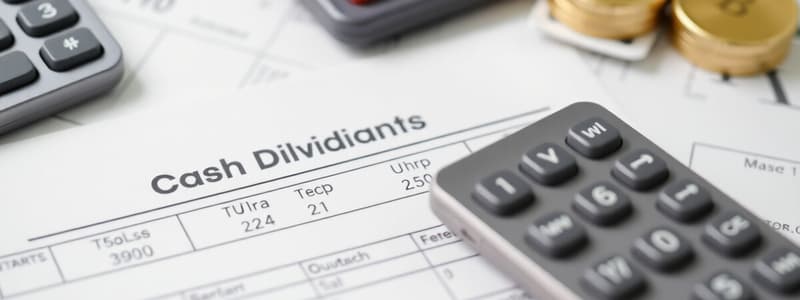Podcast
Questions and Answers
What is the first step when dividends are declared?
What is the first step when dividends are declared?
- Dr.Dividends payable
- Dr.Dividends (correct)
- Dr.Cash
- Dr.Retained earnings
What does the balance in the Income Summary account represent?
What does the balance in the Income Summary account represent?
- Net income or loss for the accounting period (correct)
- Total revenue for the period
- Total expenses for the period
- Total dividends paid for the period
How are temporary accounts closed at the end of the accounting period?
How are temporary accounts closed at the end of the accounting period?
- Closed directly to Cash
- Closed to Income Summary (correct)
- Closed to Dividends payable
- Closed to Retained earnings
What is a key characteristic of financial accounting?
What is a key characteristic of financial accounting?
When dividends are paid, which account is credited?
When dividends are paid, which account is credited?
Which type of accounting communicates information relevant for internal decision-makers?
Which type of accounting communicates information relevant for internal decision-makers?
How is the retained earnings account affected when dividends are declared?
How is the retained earnings account affected when dividends are declared?
What is an implication of closing revenue and expense accounts to Income Summary rather than directly to Retained Earnings?
What is an implication of closing revenue and expense accounts to Income Summary rather than directly to Retained Earnings?
What is the primary condition for revenue recognition under ASPE?
What is the primary condition for revenue recognition under ASPE?
Which step is NOT part of the IFRS revenue recognition process?
Which step is NOT part of the IFRS revenue recognition process?
Under ASPE, when should revenue be recognized for a flight scheduled in December?
Under ASPE, when should revenue be recognized for a flight scheduled in December?
Which of the following best defines digitization?
Which of the following best defines digitization?
What is a challenge associated with 'big data' in accounting?
What is a challenge associated with 'big data' in accounting?
In which scenario should revenue be recognized on a per-game basis?
In which scenario should revenue be recognized on a per-game basis?
Which of the following statements regarding digitalization is incorrect?
Which of the following statements regarding digitalization is incorrect?
When is revenue recognized under ASPE if an estimate of uncollectible amounts can be made?
When is revenue recognized under ASPE if an estimate of uncollectible amounts can be made?
What characterizes current liabilities?
What characterizes current liabilities?
What is considered an example of other assets?
What is considered an example of other assets?
Which of the following is NOT a type of long-term liability?
Which of the following is NOT a type of long-term liability?
How are long-term obligations defined?
How are long-term obligations defined?
What is the total purchase price of the used truck after considering the down payment?
What is the total purchase price of the used truck after considering the down payment?
Which financial metric is used to assess a company's ability to pay its debts and related interest?
Which financial metric is used to assess a company's ability to pay its debts and related interest?
Which item is typically listed first among current liabilities?
Which item is typically listed first among current liabilities?
What does the operating cycle refer to?
What does the operating cycle refer to?
In the context of the Statement of Financial Position, what constitutes assets?
In the context of the Statement of Financial Position, what constitutes assets?
How is the interest rate in the note expressed on a monthly basis?
How is the interest rate in the note expressed on a monthly basis?
Which of the following examples is included in long-term liabilities?
Which of the following examples is included in long-term liabilities?
What does a higher long-term debt to assets ratio indicate?
What does a higher long-term debt to assets ratio indicate?
Which of the following is not classified as an other asset?
Which of the following is not classified as an other asset?
What is the loan payment made at the end of each month as per the truck purchase agreement?
What is the loan payment made at the end of each month as per the truck purchase agreement?
What is the purpose of the Statement of Financial Position?
What is the purpose of the Statement of Financial Position?
What is the correct approach to calculate the present value of the loan for the truck purchase?
What is the correct approach to calculate the present value of the loan for the truck purchase?
What is the present value of $1,000 at a discount rate of 5% for 1 year?
What is the present value of $1,000 at a discount rate of 5% for 1 year?
How is the present value calculated using a financial calculator for $1,000 at the end of 1 year at 5% interest?
How is the present value calculated using a financial calculator for $1,000 at the end of 1 year at 5% interest?
Which Excel function would you use to find the present value of an investment that you will receive $1,000 in 1 year at 5%?
Which Excel function would you use to find the present value of an investment that you will receive $1,000 in 1 year at 5%?
What does the 'nper' parameter in the PV function represent when calculating present value?
What does the 'nper' parameter in the PV function represent when calculating present value?
If you want to receive $1,000 at the end of 1 year, how much should you invest today at a 5% interest rate?
If you want to receive $1,000 at the end of 1 year, how much should you invest today at a 5% interest rate?
When calculating the present value of an annuity of $1,000 paid annually for 3 years at a 4% discount rate, what is the approximate present value?
When calculating the present value of an annuity of $1,000 paid annually for 3 years at a 4% discount rate, what is the approximate present value?
What does the PV factor of 0.95238 indicate when calculating the present value?
What does the PV factor of 0.95238 indicate when calculating the present value?
If the future value is $1,000, what would be the present value if the investment requires a payment of $0 each period and lasts for one year at 5% interest?
If the future value is $1,000, what would be the present value if the investment requires a payment of $0 each period and lasts for one year at 5% interest?
Flashcards are hidden until you start studying
Study Notes
Cash Account - Debit & Credit
- When cash is received, the cash account is debited and a liability account, such as unearned revenue, is credited.
Closing Entries
- At the end of the accounting period, temporary account balances are moved to a permanent shareholders' equity account - retained earnings (R/E).
- Closing each income statement account directly to R/E would result in excessive detail in the R/E account.
- Instead, companies close the revenue and expense accounts to another temporary account, Income Summary.
- The balance in Income Summary is the net income or loss for the accounting period.
- Finally, Income Summary is closed, which transfers the net income or loss to R/E.
Dividends
- When dividends are declared, the Dividends account is debited and Dividends Payable is credited
- When dividends are paid, Dividends Payable is debited and Cash is credited.
- Dividends are a temporary SE account and must be closed at the end of the period.
- To close Dividends, Retained Earnings is debited and Dividends is credited.
Characteristics of Accounting
- Accounting measures and communicates financial information about economic entities to interested parties.
- Accounting has two broad classifications:
- Financial accounting: Includes preparation of financial statements and is relevant to internal (management, employees) and external (investors, creditors) users.
- Managerial accounting: Communicates financial information in varied forms (cost-benefit analyses, sales forecasts) and is used by management to plan, evaluate, and control operations.
- Prepaid insurance is better stated at net realizable value (NRV) than historical cost.
### E2.17 - A
- According to ASPE, revenue is recognized when:
- Risks and rewards have passed and the earning process is substantially complete.
- The vendor has no control over the goods.
- Revenue is measurable.
- Collectability is reasonably assured.
E2.17 - B
- According to IFRS, revenue is recognized by:
- Identifying the contract with the customer.
- Identifying the performance obligations.
- Determining the transaction price.
- Allocating the price to each performance obligation.
- Recognizing revenue when each performance obligation is satisfied.
Big Data
- Big Data has the following 5 attributes/challenges:
- Volume: How do we handle and store large amounts of data?
- Velocity: How do we deal with the fast speed at which new data is created?
- Variety: How do we handle the complexity and different types of data?
- Veracity: How do we ensure the quality and reliability of data?
- Value: How do we extract valuable insights from data?
PV of a Single Future Amount: Using a PV Table
- When calculating the present value (PV) of a single future amount, you can use a PV table.
- The PV factor is multiplied by the future value to obtain the present value.
PV of a Single Future Amount: Using a Financial Calculator
- When calculating the present value (PV) of a single future amount, you can use a financial calculator.
- You input the interest rate (I), number of periods (N), future value (FV), and solve for the present value (PV).
PV of a Single Future Amount: Using Excel
- When calculating the present value (PV) of a single future amount, you can use Excel's PV function: PV(rate,nper,pmt,fv,type).
- The function requires the interest rate (rate), number of periods (nper), payment (pmt), future value (fv), and payment type (type).
PV of a Series of Future Cash Flows (Annuities)
- When calculating the present value of a series of future cash flows, you can use a PV table or a financial calculator.
- The present value of an annuity is the sum of the present values of each individual cash flow.
Statement of Financial Position (SFP)
- The SFP (known as the balance sheet under ASPE) is a financial statement that shows a company’s financial condition at a specific date.
- It provides information to users for:
- Calculating rates of return on invested assets (e.g., ROA and ROIC).
- Evaluating the capital structure (e.g., long-term debt to assets ratio).
- Assessing liquidity (amount of time until an asset is converted to cash – current/quick ratio).
- Evaluating solvency (ability to pay debts and related interest).
- Understanding financial flexibility (ability to respond to unexpected needs and opportunities).
SFP: Classes
- The SFP is made up of three classes:
- Assets: Present economic resources controlled by an entity resulting from past events with the potential to produce economic benefits.
- Liabilities: Present duties that obligate an entity to transfer economic resources resulting from past events.
- Equity: The residual interest in the assets of the entity after deducting all its liabilities.
Other Assets
- Other Assets are listed on the SFP, below intangibles and goodwill, and include:
- Intangible assets.
- Non-current receivables.
- Assets in special funds.
- Land held for speculation.
- Deferred income tax assets (known as future income tax assets under ASPE).
Current Liabilities
- Current liabilities are obligations due within 1 year from the SFP date or within the operating cycle, whichever is longer.
- Examples include:
- Payables resulting from acquisitions of goods and services.
- Collections received in advance of delivery of goods or services (i.e., unearned revenue).
- Short-term financing payable on demand (e.g., bank overdraft).
Long-Term Liabilities
- Long-term liabilities are obligations not reasonably expected to be liquidated within the normal operating cycle.
- There are three types of long-term liabilities:
- From specific financing situations (e.g., issuance of bonds, long‐term notes payable).
- From ordinary enterprise operations (e.g., pension obligations, unearned revenues).
- Depending on the occurrence of future events (e.g., service or product warranties).
- The portion of a long-term liability due within the next year must be reported as a current liability.
Shareholders’ Equity
- Shareholders’ equity is the residual interest in the assets of an entity after deducting all its liabilities.
- It represents the owners' stake in the company.
- It consists of:
- Share capital (the amount of money raised from issuing shares).
- Retained earnings (the accumulated profits or losses of the company).
- Other equity components (e.g., treasury shares, accumulated other comprehensive income).
Studying That Suits You
Use AI to generate personalized quizzes and flashcards to suit your learning preferences.




